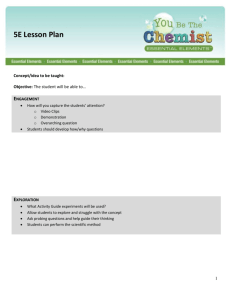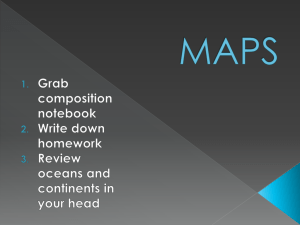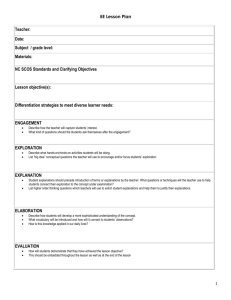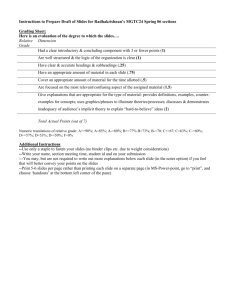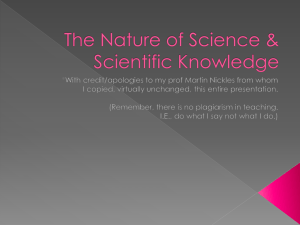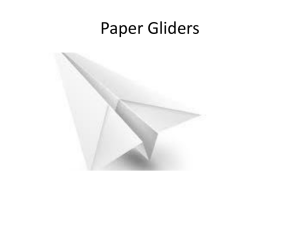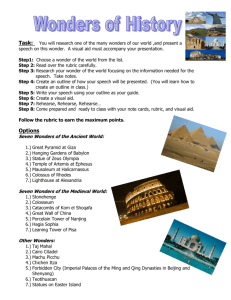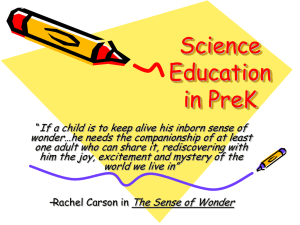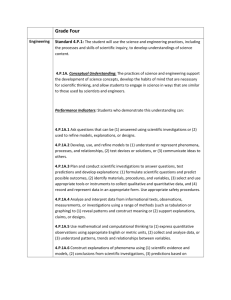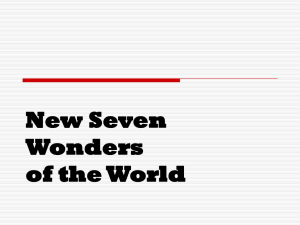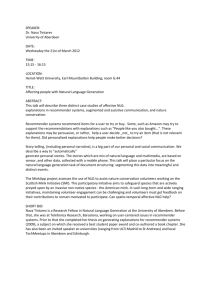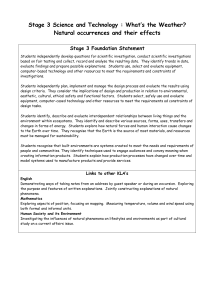What is Science? - The University of Maine
advertisement
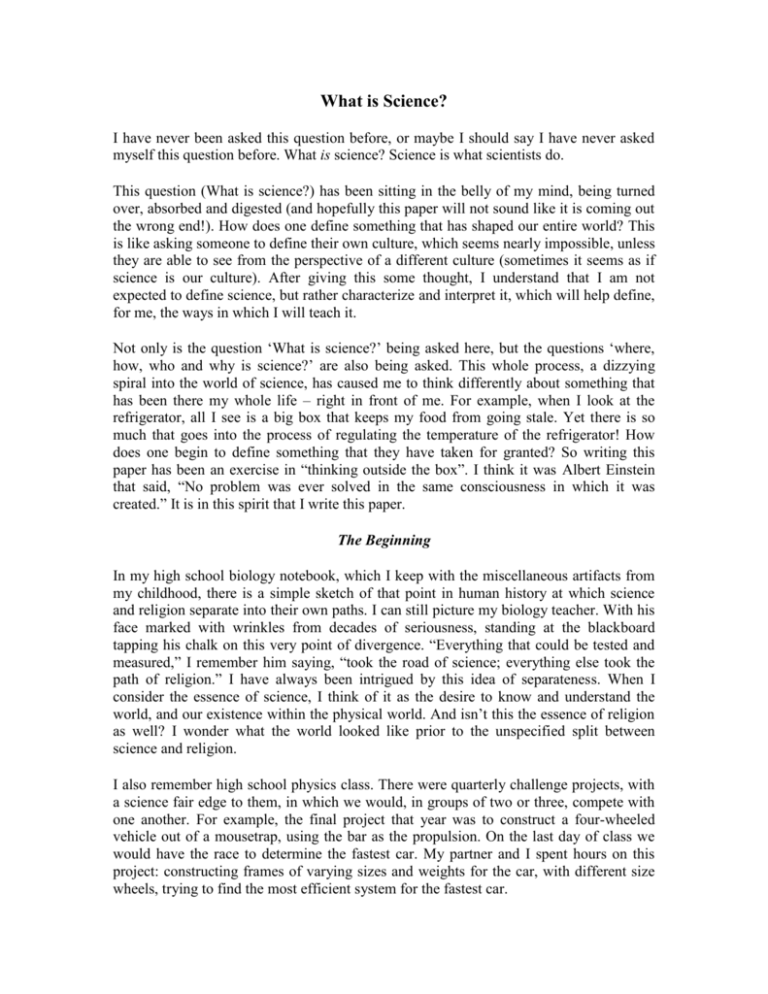
What is Science? I have never been asked this question before, or maybe I should say I have never asked myself this question before. What is science? Science is what scientists do. This question (What is science?) has been sitting in the belly of my mind, being turned over, absorbed and digested (and hopefully this paper will not sound like it is coming out the wrong end!). How does one define something that has shaped our entire world? This is like asking someone to define their own culture, which seems nearly impossible, unless they are able to see from the perspective of a different culture (sometimes it seems as if science is our culture). After giving this some thought, I understand that I am not expected to define science, but rather characterize and interpret it, which will help define, for me, the ways in which I will teach it. Not only is the question ‘What is science?’ being asked here, but the questions ‘where, how, who and why is science?’ are also being asked. This whole process, a dizzying spiral into the world of science, has caused me to think differently about something that has been there my whole life – right in front of me. For example, when I look at the refrigerator, all I see is a big box that keeps my food from going stale. Yet there is so much that goes into the process of regulating the temperature of the refrigerator! How does one begin to define something that they have taken for granted? So writing this paper has been an exercise in “thinking outside the box”. I think it was Albert Einstein that said, “No problem was ever solved in the same consciousness in which it was created.” It is in this spirit that I write this paper. The Beginning In my high school biology notebook, which I keep with the miscellaneous artifacts from my childhood, there is a simple sketch of that point in human history at which science and religion separate into their own paths. I can still picture my biology teacher. With his face marked with wrinkles from decades of seriousness, standing at the blackboard tapping his chalk on this very point of divergence. “Everything that could be tested and measured,” I remember him saying, “took the road of science; everything else took the path of religion.” I have always been intrigued by this idea of separateness. When I consider the essence of science, I think of it as the desire to know and understand the world, and our existence within the physical world. And isn’t this the essence of religion as well? I wonder what the world looked like prior to the unspecified split between science and religion. I also remember high school physics class. There were quarterly challenge projects, with a science fair edge to them, in which we would, in groups of two or three, compete with one another. For example, the final project that year was to construct a four-wheeled vehicle out of a mousetrap, using the bar as the propulsion. On the last day of class we would have the race to determine the fastest car. My partner and I spent hours on this project: constructing frames of varying sizes and weights for the car, with different size wheels, trying to find the most efficient system for the fastest car. What is Science? cont’d That was it: I was hooked. In college I majored in psychology, which allowed me (after 2 ½ years of excruciating lecture-style classes) to investigate the relationship between cause and effect. Unfortunately, the research projects I undertook turned out to be duds, and I lost my enthusiasm for research. It required incredible amounts of patience and persistence (not to mention an adequate level of mathematical ability), and I found out that there were some really boring stages in the scientific process. So, science, for me, has been a “place” of exploration and self-directed learning. There have been, however, science courses and teachers that have made science an exercise in listening to the teacher explain what we need to know on the test. Science is a difficult language to learn. It requires basic skills to understand it. It takes years of practice to communicate with it; and it requires persistence (and a little bit of luck) to master it. And it takes a skilled teacher to open up the classroom to truly teach the language of science. “Sciencing” The notion of “doing science” (or “sciencing,” as Herman Weller might say) can include three concepts. (1) To do “science” can mean one’s ability to question. This is where science starts: with the question. What has caused this area to erode? What has caused the vertical scar on the trunk of this tree? What animal has left this pile of scat? (2) But in order for these questions to find us, we must carry a sense of wonder for the world in which we live. Wherever we go: at home, in the forest, in school, and at work, this sense of wonder must follow us. I find Rachel Carson’s work to be an inspiration in this way. Her never-ending journey and exploration of nature’s wonders inspire me to keep looking closer without losing sight of the big picture. “The more clearly we can focus our attention on the wonders and realities of the universe about us, the less taste we shall have for destruction” (1954). Taken from www.rachelcarson.org. (3) Doing science also implies the process of understanding and applying the scientific process. Scientists are usually involved in investigations that hypothesize how the physical world and the systems governing it, function. A typical investigation using the scientific process might look like this: -Identify questions that can be answered through scientific investigations. - Design and conduct a scientific investigation. - Develop descriptions, explanations, predictions and models using evidence - Think critically and logically to make relationships between evidence and explanations. - Recognize and analyze alternative explanations and predictions, and - Communicate the scientific procedures and explanations (Taken from: http://www.nap.edu/readingroom/books/evolution98/evol6-a.html) What is Science? cont’d This process can be used on a variety of scientific levels. It can be applied by gradeschool children on a simple field trip to a vernal pool to explore the life that exists there, or used to determine the existence of global warming by a team of Engineers for the EPA. Reading through the online version of the National Science Education Standards, I came across this classification of science: “Science distinguished itself from other ways of knowing and from other bodies of knowledge through the use of empirical standards, arguments, and skepticism.” Written by Nate Larlee
